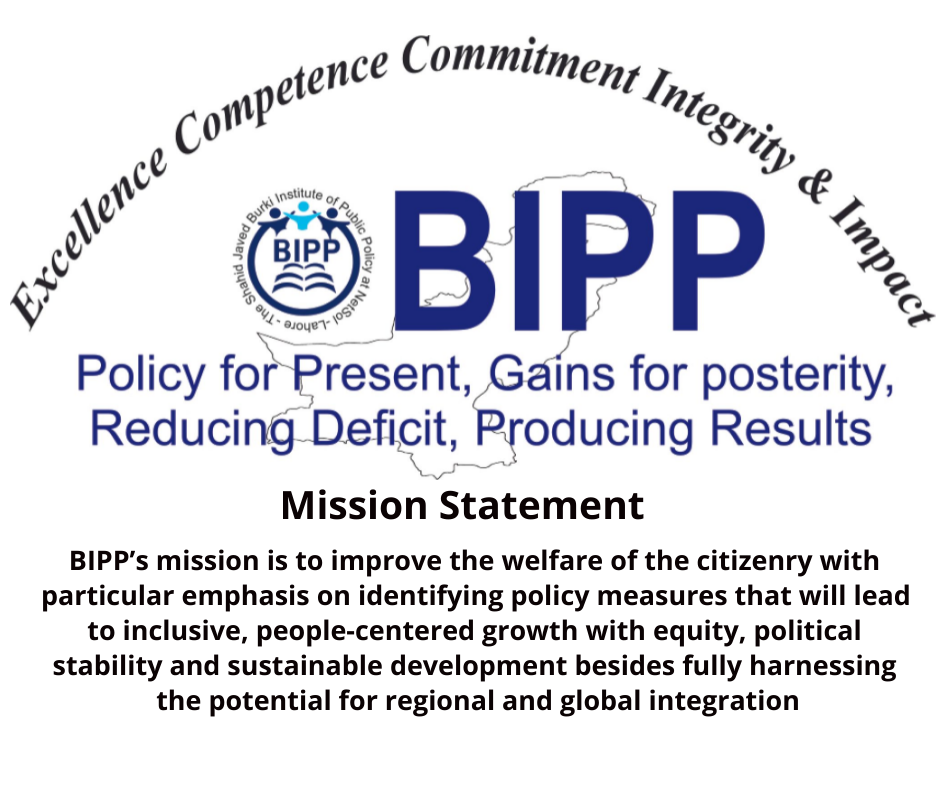Vision
BIPP’s vision is to become a Centre of Excellence and Knowledge hub for policy analysis and leadership to facilitate the robust policy making and implementation and produce leaders capable of transforming the lives of people.
Mission
BIPP’s mission is to improve the welfare of the citizenry with particular emphasis on identifying policy measures that will lead to inclusive, people-centered growth with equity, political stability and sustainable development besides fully harnessing the potential for regional and global integration of the country. BIPP primary areas of interest encompass social, economic, environmental and political development and security, trade and foreign policy related issues.
The institute aims at synergizing the research, education, think tank and knowledge management functions to become a Centre of Excellence in Public Policy.
Our core values
Integrity and Commitment, pursuit of excellence, expanding horizons of competence and knowledge, working as a highly motivated and dedicated team constitute our core values. BIPP by the way of introspection and reflection seeks to constantly improve its working methods, tools and practices to achieve efficiency and productivity gains. One of our key values is building partnership, alliances and coalitions with knowledge and research centers to generate and share ideas, use real-world experience and new knowledge, and act in concert and conjunction with others to influence the policy and decision processes for sustainable human development.

Who we are?
The Shahid Javed Burki Institute of Public Policy at NetSol (BIPP) is an independent, not for profit institution which aims at: promoting rights and evidence based inclusive policy making; filling institutional void and professionalizing the key public policy areas; and, serving as a knowledge hub for policy analysis, development and implementation. The public policy process in Pakistan has been characterized generally by huge rationality deficit primarily owing to a lack of serious analytical work, exclusivity and weak systemic nexus between education, research and policy formulation. The dearth of strong leadership that will make a difference at the national and local levels further aggravates the problem. BIPP's aim is to minimize this rationality deficit and produce leaders to bring tangible welfare gains for the citizens. Its Board of Governors comprises eminent experts, economists, scholars, academia and development practitioners from public, private and non-governmental sectors. As such, BIPP represents a unique blend of expertise to enrich both upstream policy process and downstream implementation. BIPP's mission is to produce leaders and improve welfare of the citizenry with particular emphasis on identifying policy measures that will lead to inclusive growth, socio-economic stability and sustainable development besides fully harnessing the potential for regional and global integration. BIPP's areas of interest are: social economic, environmental and political development, trade and foreign policy. The Institute aims at synergizing the research, education and think tank functions to become a knowledge hub and Centre of Excellence in Public Policy. BIPP will strive to:
- Develop strategies to put ethics and excellence in the performance of the institute;
- Promote constructive debate and analysis on policy issues through a global community that builds on existing local and regional networks.
- Pursue evidence based collaborate research work and share strategies, innovations and technologies that facilitate strong linkages among public policy research organizations and other institutions around the world;
- Promote interdisciplinary dialogue among think tanks, policymakers, and members of civil society to explore how the sustainability of think tanks can play a crucial part in civil societies;
- Serve as a discussion forum to engage with and share best practices for evidence based policy making through interaction with senior researchers, development practitioners, eminent experts, economists, policymakers and members of civil society; and
- Operate as a virtual global think tank that will allow collaboration, exchange of knowledge and information, and sharing of upstream policies and policy-proposals among Think Tanks.
